 Loading...
Loading...-
Vladimir Putin might be nostalgic for the Czarist Russian Empire, but that has not stopped him from taking a page from Stalin’s playbook. Since he began the full-scale invasion of Ukraine, on February 24th 2022, the Russian political and military leadership have been accused of a number of war crimes. These include, but are not limited to, indiscriminate attacks on civilians, torture and rape.
But while the whole world was focused on the atrocities of Bucha and Irpin, a more “invisible” war crime was taking place – forced deportations of Ukrainians from the occupied territories, and the abduction of Ukrainian children on an industrial scale, which earned the Russian Federation’s President an arrest warrant, issued by the International Criminal Court. But let us take a step back and analyse the Russian deportation phenomenon and the twisted ideological reasons behind it.
In 1940, when the Red Army annexed territories in eastern Poland, about 250,000 Poles and thousands of Ukrainians and Belarusians were deported to Siberia and to Asia in order to remove the most active populations from the annexed territories. In 1941, after insurrections that followed the Baltic States’ annexation, the Soviet central apparatus decided to deport groups of Lithuanians, Estonians and Latvians: about 48,000 people were sent to Siberia.
The deportations were followed by the relocation of ethnic Russians to these territories. The goal was always the same – weaken the national sentiment of the populations living in the occupied territories, remove the threat to the regime and proceed with the russification of the people living in the then-USSR.
After the fall of the Soviet Union, many ethnic Russians who were relocated to other Soviet republics remained there, even after these countries declared their independence. This in part allowed Vladimir Putin to use the Karaganov Doctrine, which states that Moscow should position itself as the defender of the human rights of ethnic Russians living in the “near abroad”. This was done for the purpose of gaining political influence in these regions. Russia’s illegal annexation of Crimea and support to the Donetsk People’s Republic and the Luhansk People’s Republic were carried out following this playbook.
Before invading Ukraine in early 2022, Moscow had been slowly but steadily distributing Russian passports to Ukrainians living in the regions of eastern Ukraine under Russian control. According to Russia’s Interior Ministry, more than 527 000 people have been granted Russian citizenship between 2019 and 2021.
But with the full-scale invasion and the subsequent resistance from local populations, many Ukrainians were forcefully deported. While Russian authorities claim that these are war refugees who willingly decided to flee to Russia, the reality is quite different. In the first six months of the war, 1.5 million people were forced to board buses headed to filtration camps. In these camps, refugees endured intense interrogation, often facing verbal abuse, threats, or physical violence. They were then sent to temporary accommodation centres, some as far as 7,000km from their homes.
Those detained, or “filtered out”, include Ukrainians deemed threatening because of their potential affiliation with the Ukrainian army, media, government, and/or civil society groups. Considering that all humanitarian evacuations should be voluntary, safe and informed, and given the coercive environment in which these evacuations to Russia took place, we can say without a doubt that the Russian Federation is committing the international crime of forcible transfer of population.
What earned Putin an international arrest warrant, however, was the forceful transfer of children in particular.
According to Ukrainian officials, more than 16,000 Ukrainian children have been forcibly deported to Russia or Russian-controlled Ukrainian territories, with only 300 returning to Ukraine thus far. This number includes children separated from their parents, with no identification nor information on the location of their family and children from orphanages and care institutions.
Once in Russia, they are enrolled in local schools and sit through classes that include revisionist history lessons, while being forced to go through psychological “rehabilitation”. Additionally, legislative amendments have been initiated in the Russian Federation to make it easier for such children to acquire Russian citizenship or to be adopted by Russian families, which would violate the Geneva Convention prohibiting the change of a child’s personal status, including its nationality.
Along with the arrest warrant for Putin, Maria Lvova-Belova, the mastermind behind the use of camps for ‘integrating’ Ukraine’s children into Russia’s society and culture, is also wanted by the ICC. However, the political and military elites are not the only players to be blamed for war crimes. Russian religious leaders continuously support Putin in the monstrosities suffered by the Ukrainian people.
To gather and track information about abducted children, the Ukrainian government has established a platform, “Children of War”. Additionally, Ursula von der Leyen, in partnership with the Ukrainian authorities and the Polish Prime Minister Morawiecki, announced the launch of an initiative working towards the goal of returning abducted Ukrainian children to their home country. However, ensuring that the enablers of all these war crimes are brought to justice remains equally important. The international community, with the EU at the forefront, should take all the necessary steps to bring the perpetrators to trial and re-establish the rules-based international order. Russia has gone to great lengths to try and delete Ukraine, its population and its national identity, including stealing the country’s future – its children – and for that, it cannot go unpunished.
Anna Nalyvayko Human Rights Ukraine

Anna Nalyvayko
Deportations, abductions and forced Russification – the fate of Ukraine’s Children of War
Blog - Ukraine
28 Mar 2023
-
On 26 June 1963, the then-President of the United States John F. Kennedy delivered his famous “Ich bin ein Berliner” speech, underlining the support of the Free World for West Berlin and West Germany.
47 years later, the Special Procedure 50 of the UN Human Rights Council has issued a statement denouncing Beijing’s repression of Tibet and Hong Kong. The statement came just before the National Security Law in Hong Kong was approved by the Standing Committee of the National People’s Congress.
The Pearl of the Orient has suddenly earned a new name, as the “West Berlin” of the New Cold War.
However, unlike in West Berlin, Beijing did not build a wall to prevent its corporations from investing in Hong Kong, nor did it ask foreigners to leave the territory. Beijing has instead always proclaimed that the National Security Law’s introduction was to provide extra assurance of the famed “One Country, Two Systems” doctrine coined by Deng Xiaoping, a leader China has long outgrown.
However, it is precisely this kind of attitude that should push the European Union to act – beyond expressing “grave concern” – and take the Hong Kong question seriously. The enactment of the National Security Law is a litmus test of the EU’s capacity to defend its interests and universal values in the context of the “Great Decoupling”.
International relations academics and EU specialists agree that contemporary EU-China relations are determined by two factors (as suggested by Michael Yahuda). First, the tyranny of distance, and second, the primacy of trade. In short, owing to the lack of geopolitical ambition of the EU and the absence of shared geographical boundaries (terrestrial or maritime), the protection and promotion of EU economic interests in China is the core driver of EU action towards China. As a result, the European Union has long been satisfied with the current model of cooperation. In the field of trade and investment, the EU opts for a good trade agreement with the absence of a human rights clause (from the Trade and Cooperation Agreement signed in 1985, to the long-awaited conclusion of the EU-China Comprehensive Agreement on Investment). Unlike its “selective engagement” approach with Russia, the European Union currently does not link its business presence in China with better political development and social reform – not to mention the suspected violation of citizens’ safety in Hong Kong.
The Pearl of the Orient has suddenly earned a new name, as the “West Berlin” of the New Cold War.
However, the new reality after the enactment of the National Security Law in Hong Kong demands exactly this. As detailed in Article 38, the Law will have extraterritorial effects, as it applies to offences committed outside Hong Kong by a person who is not a permanent resident of the Region. For example, any person who joined the Martens Centre’s recent online webinar discussing the situation in Hong Kong is at risk of prosecution under Article 38, as participating can be viewed as provoking hatred, or even sanctions towards Beijing. The National Security Law is without a doubt a threat against the fundamental rights and freedoms enjoyed by European citizens, political parties, think-tanks, or activist groups. The message from Beijing is clear: anyone who wishes to do business in Hong Kong must respect China’s concept of national security – regardless of that person’s nationality or their locality.
The National Security Law impacts European corporations as well. According to the latest implementation rules, the authorities are empowered to “freeze, restrain, confiscate, and forfeit any property related to offences endangering national security”. They also may require foreign political organisations and agents to provide information on activities concerning Hong Kong. The Law deliberately creates a dilemma and makes it clear to European companies. If a company surrenders information to the authorities, they violate their clients’ goodwill. If a company does not cooperate, its business interests in Hong Kong and mainland China will suffer. Beijing is effectively leveraging the West’s extensive business network and economic interests in Hong Kong, in order to test the European Union’s ability to balance its pursuit of commercial benefits and commitment to universal values.
From Beijing’s perspective, should European companies and EU Member States kowtow to the new arrangement in Hong Kong, Beijing will have full confidence that economic interests will always serve as good diplomatic leverage against the EU. In this case, the comprehensive investment agreement in its current form serves the foremost political interests of Beijing. Maintaining the status quo does not give the European Union any competitive edge against China’s sharp power in Europe. Only by acting in one voice and addressing the Hong Kong question seriously, can the European Union change the status quo and explore new possibilities in EU-China relations.
This article does not advocate for sanctions against Beijing, nor does it ask the EU to provide a UK-esque lifeboat policy to the citizens of Hong Kong. Instead, this thesis pleads for Europeans to act with one voice, and for the European Union to re-discover its diplomatic capacity, rooted in the commanding strength of the Common Market, and its formidable global regulatory regime. As history once showed, any hesitation would turn Europe into an ideological battlefield. Should there be a New Cold War in the 21st century, Brussels ought to utilise its structural strength to protect the very foundation of Europe’s peace, prosperity, and the well-being of its citizens.
Credits: Image by Jimmy Chan on Pexels
Hong Kong Global Research Council Democracy European Union Foreign Policy Human Rights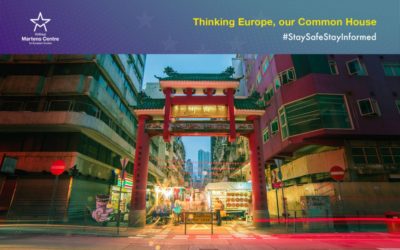

Hong Kong Global Research Council
More than “West Berlin”: The EU should take the Hong Kong question seriously
Blog
27 Jul 2020
-
It is not the first time that Turkey is using civilians as human shields and tools of its foreign policy. During the Great War, the Ottoman Empire deported and exterminated a large part of its Christian population. In 1938, the Kemalist Republic followed a similar policy in Alexandretta. In September 1955, the Turkish state was behind the brutal “pogrom” against the Greek-Orthodox population of Istanbul. Two decades later, Turkey invaded the Republic of Cyprus and forced thousands of Cypriots into exile.
The same strategy is being used today on the Greek-Turkish border. Greece is facing an ongoing hybrid attack on land, sea and air by a so-called NATO ally. Recently, reports of cyber-attacks towards the Greek government and other sensitive sectors of the Greek state by Turkish hackers were published in the international press. In the first months of 2020, the violation and infringement of Greek airspace – with armed planes flying even over inhabited Greek islands in the Aegean – has reached new records.
The recent decision by Erdogan and his authoritarian regime to encourage and push thousands of desperate people towards the north-east Greek sea and land borders comes as a natural continuation to a series of aggressive actions taken against Greece and Cyprus in the Eastern Mediterranean. These actions include illegal exploration activities in the Economic Exclusive Zone (EEZ) of Cyprus and the illegal Turkish-Libyan Memorandum of Understanding (MoU) that openly violates Greek territorial sovereignty. In addition, reports and footage show that the movement of immigrants -including criminals detained in Turkish prisons- is being implemented with the active participation of the Turkish armed forces, police and the Turkish intelligence services (MIT).
Turkey has become a state “trafficker” that does not recoil from politicising human pain and misery, in order to make political gains. The Greek government’s rightful decision to increase the level of deterrence at its borders and temporarily suspend the asylum applications is the only possible reaction for any state intent on protecting its territory from a well organised hybrid attack.
In the last 3 days, there have been over twenty-four thousand instances of people illegally attempting to cross into Greek territory. In Evros, less than 200 were successful, in which case the intruders were immediately arrested. On Monday alone, over 1.000 arrivals were recorded on the Greek islands of the Northern Aegean. The situation is tense and a fatal accident could turn the whole situation into something that risks becoming uncontrollable.
Turkey has become a state “trafficker” that does not recoil from politicising human pain and misery, in order to make political gains.
It is more than certain that Erdogan’s regime will use fake-news and propaganda in order to attract public sympathy and portray Greece and Europe as the offenders. Turkey de facto cancelled the EU-Turkey Statement and Action Plan. Those who speak about asylum and international humanitarian law from the comfort of their office thousands of miles away from the Greek border tend to forget the geopolitical realities in the region. We are no longer talking about individuals who are escaping conflict zones. What we see is uncontrollable masses trying to reach Europe in huge numbers under the direct encouragement, guidance and facilitation of an official state actor and its services.
Greece and Europe should not succumb to Erdogan’s “Kapalıçarşı”[1] style of bargaining. If you lie down with the devil, you will most probably find yourself in hell. Turkey tried to act as a regional superpower and now reaps what it sowed in Syria. Erdogan, in his vanity, initially supported the ISIS jihadists, then turned against the Kurds and the West. Now, after his military disaster in Syria, he is trying to exercise pressure on Europe and the West in order to save himself from the chaos he created.
Those in Europe who suggest appeasing Erdogan by sacrificing Greece’s national security should take into consideration that this is a great chance for the EU. It can show that it is a real Union with borders and common values, and that it stands ready to defend them. Today Greece is the frontline and the bastion of Europe. Beyond Greece’s borders, democracy and logic stops.
In the midst of all of this, the loud silence of many prominent politicians in European capitals is extremely worrying. Politicians once vocal about the values of European civilisation are today finding it hard to say anything to strengthen the morale of a country that, at this very moment, is defending the European way of life in practice. Apart from the three EU institutions, only Austria, the Netherlands, France, and North Macedonia have openly expressed their will to actively support the Greek forces.
For more than five years, amid a tremendous financial crisis, the Greek population has shown strong solidarity and compassion to the tragedy of all displaced people reaching Greek shores. It seems that this has changed. Local societies can no longer bear an additional influx of immigrants as in 2015. The Greek state is determined not to allow additional “Morias” (this refers to the name of a town in the island of Lesbos that hosts a by now notorious squalid camp) to be formed around the country. Instead, it is only fair that Greece’s European partners step up to the plate.
Usually polarised and divided along partisan lines, all Greeks are currently appearing united against Turkey’s plans. Greeks are determined to defend their country, and thus Europe, at any cost. There is no room for compromise in Turkey’s efforts to destabilise Greece and move forward with claims that put in question the territorial integrity and sovereignty of Greece. Europe should act in this crisis as one if it wants to be taken seriously as a ‘sovereign’, ‘strategic’ and ‘geopolitical’ actor, to use some of the slogans repeated by its leaders in recent years. There is no time for simple statements of support. Tools and manpower must be deployed in the heated zone of Greece’s borders.
[1] Kapalıçarşı / Grand Bazaar of Istanbul is one of the oldest, covered markets in the world.
Panos Tasiopoulos Crisis European Union Human Rights Immigration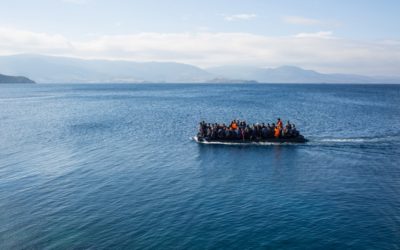

Panos Tasiopoulos
Turkish Bazaar: An asymmetrical threat to the EU
Blog
03 Mar 2020
-
Superficially, one might frame Venezuela’s current drama as the classical conflict between a regional hegemon (in this case: the US) and a nearby country (Venezuela under Chavez/Maduro) whose government tries to escape the bully, seeking outside help (read: Russia) and promptly being confronted with a hegemon-sponsored insurrection (Guaidó).
In other words, Ukraine in the Americas. That’s the picture that Kremlin media are painting, pointing once more at the alleged ‘hypocrisy’ of the West, unfortunately but predictably seconded by a ragtag coalition of European ‘progressives’, populists and self-appointed geo-strategists.
In their eyes, what we are seeing is just another case of the jungle growing back over the remnants of the Western-dominated world order of the second half of the 20th century. In that vein, it would make sense for Europe to stay out, or limit its actions to the habitual appeal to both sides ‘to refrain from escalation and exercise utmost restraint’.
What Venezuela has in common with Ukraine
But nothing is further from the truth. There is a parallel between both cases, but it works exactly the other way around than self-appointed realpoliticians and progressive Kremlin appeasers would have it. Just like Viktor Yanukovych in Ukraine in 2014, a systemically corrupt, kleptocratic leadership under first Hugo Chavez, then Nicolás Maduro, has ruined the country – albeit in Venezuela’s case even more dramatically than in Ukraine’s.
In both cases, Putin’s Russia has been the protector of the corrupt regime, doing its best to help the local strongman to suppress any democratic opposition and trying to keep out Western support for the democrats who want nothing else than to restore a modicum of stability, regain prosperity and enhance the rule of law – again, this happened even more drastically in Caracas than in Kyiv.
Putin’s game
But as much as the Kremlin may be able to destabilise Ukraine through military aggression and try to prevent it from politically becoming part of the West, the question is: why does it cling to an apparently lost cause such as keeping Maduro in power in faraway Venezuela?
There are several factors at play: first of all, Maduro’s reign may not be such a lost cause, at least in the immediate future. Assad’s rule in Syria seemed over by the summer of 2011. Eight years later, he is firmly back in power, thanks to a combined Russian and Iranian intervention.
Although it is unlikely Russia or any other outside player would intervene in Venezuela as massively as that, it is very much in Putin’s interest to demonstrate that authoritarian rulers can be saved if they are friends with him. Allegedly, 400 private security personnel have already been sent by the Kremlin to Venezuela.
Second, as the Kremlin thinks of the world in terms of spheres of influence, and of relations between Russia and the West in zero sum terms, it makes perfect sense for Putin and his entourage to not only defend his own ‘backyard’, but also attack the opponent’s.
Third, every ‘saved’ autocrat across the globe helps the Kremlin to spin its narrative that authoritarianism is the wave of the future, and democracy (i.e. the West) is on the wane.
Putin has this point in common with all other autocrats around the globe, of course, as well as the fourth point: the strict principle of non-intervention other than to save the incumbent government, no matter how illegitimate, and the total rejection of any Responsibility to Protect (R2P).
To defend Russia’s substantial investments into Venezuela may be a fifth point: at a time when real incomes are falling in Russia itself, costly foreign adventures that bring no returns are increasingly hard to justify.
Sixth, in Xi Jinping’s China Putin has a powerful ally – whose financial investments weigh even more heavily than Russia’s. Xi, although less keen than Putin for open confrontation with the West, nevertheless does subscribe to most of Putin’s points regarding a global effort to sustain autocrats.
The delusion of realpolitik and the correct response of the West
The West urgently needs to react to this, and demonstrate that solidarity against dictators can be stronger than the naked violence used by Maduro’s regime against its own people. Prolonging Maduro’s rule would not only be inhumane for the Venezuelans.
It would also prolong a source of instability, mass migration and organized crime that Venezuela has become in recent years and that threatens the entire region.
Support for Venezuela can range from political declarations to aid deliveries, to financial and other support for the opposition, to economic sanctions against the regime and ultimately – as a means of last resort – to military support or intervention. Especially the latter point is hotly debated, after the experience of the past 2 decades in Afghanistan, Iraq, Libya and Syria, but to take military intervention off the table from the very beginning is nonsense.
The question is not whether ‘war is the solution’. The question is always whether we can come closer to any solution without the use of the military.
Venezuela today, just as Ukraine in 2014, show that saving the incumbent government for the sake of international stability, if it has as consistently failed as here and begins to slaughter its own population, is neither realistic nor humane. It breeds catastrophe.
Venezuela used to be a rich country for Latin American conditions; it has a middle class (in place or in exile) which is capable of returning stability, democracy and prosperity to this country. That is why Europe and the Americas jointly need to act now.
Roland Freudenstein Democracy Foreign Policy Human Rights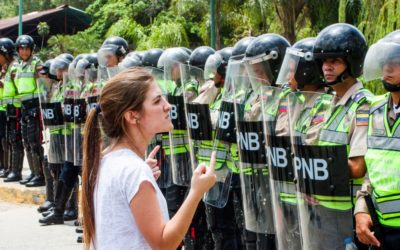

Roland Freudenstein
Venezuela’s Maidan moment – and why Realpolitik is against the interests of the West
Blog
25 Feb 2019
-
In 2007, Kofi Annan—then Secretary General of the UN—called the twenty-first century “the era of NGOs’. We think Mr Annan had little idea of how true his statement would prove to be, but probably not in the ways he imagined.
Annan referred to the importance of NGOs in policymaking, in mobilising public opinion and in holding power to account. In contrast, in the second half of 2018 NGOs – manifestations of civil society that are independent of the state – are increasingly becoming tools of political struggles. This concerns both relations between countries and the domestic situation in EU countries.
Several narratives on NGOs are emerging. The European centre-right, in contrast to its statist opponents on the left and right, believes in self-organisation of society and in the non-profit sector. A vibrant civil society and NGOs that can operate freely, are part of every liberal democracy.
However, this does not mean that civil society is on par with democratically elected institutions, as some Greens and leftists would have it. We also do not believe that governments have an obligation to finance every NGO, regardless of its professed principles and beliefs. At the same time, democratic governments should not impede NGOs’ work through punitive measures, legal discrimination and public bullying.
This is especially important, not only in view of the upcoming election to the European Parliament, but also in terms of a viable long-term outlook for democracy and transparency in the EU.
Starting with the international context, most of the European centre-right is aware of the normative and political threat that comes from the world’s authoritarian regimes. A new report on ‘sharp power’, developed by the Washington-based National Endowment for Democracy, documents the use by Russia and China of registered organisations that are linked to lobbying efforts on behalf of their mother countries.
Although these organisations are nominally independent, they are directed and financed by governments (a Martens Centre study published in 2016 looked specifically at Russian ‘government-organised non-governmental organisations).
What is more contentious, is narratives that cover domestic NGOs. First, governments in countries such as Poland, Hungary and, to some extent, Romania have been targeting the non-profit sector (often privately-funded) as an enemy of the ‘real people’ and the white and Christian European civilisation. The vocabulary used against these NGOs bears a strong resemblance to communist-era propaganda against any democratic opposition. For Christian Democracy and the wider centre-right, conspiracy theories inspired by the dark 1930s should be out of the question.
Second, NGOs have been active around immigration and asylum, often at the EU’s external sea and land border. Organisations such as Médecins Sans Frontières and countless others have been rescuing people drowning in the Mediterranean Sea. During the refugee crisis of 2015-16, other NGOs were often the only entities to feed and shelter refugees stranded the Western Balkans.
Things become really complicated when looking at the activities of humanitarian NGOs that signed up to save the lives of shipwrecked migrants in the Mediterranean, but end up being little more than ferry services straight from the Libyan coastline to Italy. Their refusal to cooperate with the Italian government has led to an open and largely unresolved conflict, resulting in ships being impounded.
NGOs in the immigration and asylum context have to be evaluated case-by-case, and though many perform important humanitarian tasks, some are clearly in contravention of EU and member state law. For example, activist organisations such as the ‘No Border’ network are openly violating the legal order of EU member states.
A third, and completely different, narrative about the NGOs exists in relation to the use of EU funds by organisations that campaign against the EU’s interests, sometimes openly spreading false information. The Martens Centre has highlighted political communication campaigns orchestrated in Germany and Austria by green and left-wing political parties, and associated civil society organisations, against a vital EU interest in concluding the Transatlantic Trade and Investment Partnership Agreement (see also here). These concern go hand-in-hand with concerns over inequity, fragmentation and a lack of transparency in financing from the EU budget.
What should be the line of argument for the centre-right?
Europe’s conservative, Christian Democrat and liberal forces should insist on the NGO financial and lobbying transparency, whether the lobbying is done for autocrats, business interests or charitable purposes; but they need to refuse Russia-style punitive transparency, the only goal of which is harassment of activists.
The centre-right parties should insist on clarity and a level playing field in EU and government funding for NGOs. They should reject those NGO campaigns that blatantly distort the facts. There is no obligation for the EU to finance organisations fundamentally opposed to it.
Europe’s centre-right should discuss how NGOs influence public discourse and which methods are used to this aim, but it should firmly object to government centralisation and control of the independent sector. All this because subsidiarity, our cherished principle, is also about letting society govern itself.
Vít Novotný Roland Freudenstein Development Human Rights Social Policy Society

Vít Novotný

Roland Freudenstein
Non-governmental organisations and the centre-right: it’s complicated
Blog
04 Jun 2018
-
If Greeks themselves do not trust their own government and their own banks with their money, it is difficult to expect the taxpayers of other countries to do so. Yet that is what the critics of the severity of the conditions imposed for the third Greek bailout seem to expect.
The euro was not imposed on Greece. It was something that Greece joined of its own accord. The fact that the possibility of Greece leaving the euro was raised by Germany, has been greeted by some as dealing a blow to the euro, because it supposedly ended the notion of the euro being “irreversible”. But nothing in political life is irreversible, even though some things, like the Byzantine and Ottoman Empires, did last a very long time indeed. “Irreversibility” was always a legal fiction, and fiction is not a sound basis for an economic policy.
The euro is a contingent compromise, where members trade some short term losses for greater long term gains. A euro, where rules were easily broken, would not endure. I agree with those who say that, eventually, some of the Greek debt will have to written off. That is both financially necessary and morally just. But that can only be contemplated when the Greek political and administrative system has reformed itself, and is capable of benefitting from a write off, and not looking at it as a precedent for a further write offs later on. We are not there yet.
The crucial difficulty seems to be that the Greek state does not work. The fact that Tsipras’ offer of reforms had to be crafted, not by Greek civil servants on their own, but with the help of French officials, tells its own story.
Some complain that elements of the package involve intrusion on Greek “sovereignty”. But a state is only sovereign to the extent that it is capable of fulfilling the internal and international responsibilities of a state. I believe Greece needs help in this regard, and it would be good if the World Bank, as well as the IMF, were involved in helping Greece reform its public administration.
Recapitalising the Greek banks will be a major task. Interestingly the biggest national exposure to the Greek banks is by banks in the UK. The UK is not in the euro, and is not contributing to the Greek bailout, which could be regarded as unfair.
Some argue that the austerity, that Greece is going through to meet its international obligations, is damaging its economic growth prospects. In the short run, this is true. But fuelling temporary growth, by taking on even MORE debts, would not be an answer. That would weaken longer term growth prospects, because of the additional debt service it would entail. This is the problem. The opponents of austerity never explain where the extra money would come from, other than from inflation and devaluation, and they solve nothing.
The important way of improving growth prospects is by generating confidence. If people believe the future will be better, and can borrow money to invest in it, the economy will grow. With renewed confidence, some of the money that Greeks themselves have moved abroad will then come back to Greece. If the bailout terms are fully and quickly implemented, by both Greece and its creditors, that will restore confidence, especially if it is rewarded by a prospect of some conditional and staged debt write offs in the future.
Meanwhile, Greece is in close proximity to the biggest refugee crisis in world history, caused by the Syrian and Iraqi civil wars. More migrants are now arriving in Greece from the Middle East, than are arriving in Italy from North Africa. 65% of the arrivals in Greece are Syrian. Greece’s neighbour, Turkey, is already providing shelter at its own expense for 1.8 million Syrian refugees. Meanwhile most Western countries are reluctant to take in any refugees. Greece, because of its geographic position, does not have that luxury.
The European Union should reorientate its Development Aid programmes to help middle income countries, like Greece, Turkey, Lebanon and Jordan, which are facing major refugee inflows, to cope with that huge burden. Some EU countries, like Germany and Sweden, are hosting many refugees. But most are keeping their heads down and doing little or nothing.
There should be burden sharing, based on relative income and population. Countries that are receiving the largest proportionate number of refugees should be getting direct ongoing cash help from those that are receiving the least.
John Bruton Crisis EU Member States Foreign Policy Human Rights Migration

John Bruton
Greece and the refugee crisis
Blog
14 Jul 2015
-
Yesterday, we commemorated the 25th anniversary of the Tiananmen Square protests of 1989, or as it is called in Chinese, the 4th of June incident (六四事件). That day marks a turning point in Chinese history as much as the year 1989 has been a crucial turning point in world history. On that date a student-led occupation of Tiananmen Square, which had been ongoing for seven weeks, was stopped.
The protest was triggered by the death of former Communist Party of China (CPC) General Secretary Hu Yaobang in April 1989. Students took to the streets to voice their criticism of the high level of corruption in politics and demanded political change in favour of a more liberal system. The Chinese government has condemned the protests to this day as a ‘counter-revolutionary riot’, and has prohibited all forms of discussion or remembrance of the event since. But did the Tiananmen Square protests nevertheless have a long-lasting impact, and led to some democratic progress in China?
One of the most recognised photographs of these protests in Western media is that of a lone man facing tanks driving out of Tiananmen Square. It does not just symbolise a protest movement that didn’t stop despite the fact that several hundred people were killed by armed forces the day before, but also the fact that ever since the 4th of June 1989, the CPC has been acting out of fear of a repetition of such political protests. In the following years, the CPC decisively implemented economic reforms but combined these with political oppression. These driving forces of Chinese politics can still be witnessed in every day policy decisions. Party officials are eager to appeal to the masses through the recently introduced anti-corruption campaign and economic reform package by President Xi Jinping. These steps are part of an effort to achieve political legitimacy through performance.
The political aftermath of Tiananmen therefore has become a political paradox in the eyes of Western observers: free markets combined with a hindered free will, a toothless and powerless justice system, and an oppressed national media. Apart from this general impact, two different trends over the last five years show that ideas of democratic participation still exist in China and find their roots in the Tiananmen Square protests.
The first one is the increasing internet access and use that has led to more public pressure regarding certain policy issues, such as transparent budget spending and environmental pollution. Local party officials are being scrutinised by the public and there have been several cases where such pressure led to resignations of officials because of corruption. As a consequence, the costs to the Chinese government to maintain stability by spending more and more resources on curtailing the free exchange of information and opinion have risen.
The CPC has pushed for projects such as the ‘Great Firewall’ and the ‘Golden Shield’ to create a truly national internet that is filtered and monitored in real-time. It created a cyber-cage in which ideas are allowed to flourish as long as they do not challenge the party line. This also includes and allows for criticism of local party officials as long as it does not turn into a general criticism about one-party rule. This concept of guiding public opinion is deeply connected to the party’s recollection of the Tiananmen protests. In the 1990s former leader Jiang Zemin emphasised that ‘control of news and public opinion has to be placed firmly in the hands of those who have a deep respect for Marxism, for the Party and for the people.’
Nevertheless, the internet remains the most crucial battleground for public opinion in China. What freedom of information can achieve is demonstrated by the example of the fishing village of Wukan. In light of a serious corruption case and after much public pressure, the CPC agreed to hold free and democratic elections with truly independent candidates. These local elections are held every three years for local village committees all across China, but are usually manipulated by local Communist party officials. Nevertheless, this case shows us that there is mounting pressure on the Communist leadership to implement political reforms and that local elections offered the citizens of Wukan a tool to demand change without violence.
A second trend is the closer involvement of social organisations in the Chinese political system. These organisations have moved from abstract demands like democracy, to specific policy issues such as the environment, birth control and education. They have changed strategy, learning from the political oppression of the past 25 years, and don’t include oppositional thinking directed against the state. This has led gradually to more empowerment of grass-roots organisations which use concrete cases to raise their political demands and win the public’s trust and, more importantly, the trust of the CPC.
The New Citizens’ Movement (NCM) is part of this trend that calls on the CPC to respect constitutionally guaranteed rights, enforce transparency of officials’ assets and ensure equal access to education. But the case of the NCM founder Xu Zhiyong, who was sentenced to four years in prison in January, also shows that there is a thin line between civic activism and unrest as perceived by the CPC. Today, China is not a democracy in a Western liberal sense. The CPC has a monopoly on political power, and the country lacks freedom of speech, an independent judiciary, and other fundamental attributes of a pluralistic liberal system.
The strengthening of civil society in our understanding of the term will continue to be perceived by the CPC as a frontal assault on its authority: in April 2013, an internal memo ‘Document No. 9’ was issued to all cadres throughout the country, warning party members that they risk losing their authority unless they address ‘subversive currents coursing through Chinese society’. These include ‘Western constitutional democracy’, human rights, media independence, civic participation, pro-market ‘neo-liberalism’, and outside criticism of the party.
To conclude, the Tiananmen Square protests have had a long-lasting impact on the democratic progress in China because they defined an approach of ‘adaptive authoritarianism’ in the CPC that is nurtured by the fear of losing control over the masses. However, there are signs of hope for more liberal concepts based on constitutionalism and democratic participation. In this regard, Hong Kong and Taiwan are proof that the rule of law and a liberal democracy are very well compatible with a Confucian culture.
Benjamin Barth Democracy Human Rights

Benjamin Barth
Did the Tiananmen Square protests lead to more democracy in China?
Blog
05 Jun 2014
-
Following the Arab spring, the power of social networks to drive social protest movements was acknowledged worldwide. Social networks, used mainly by young people, collected and crystallized their demands for change and also gave them the opportunity to get in touch with each other.
However, the official regimes in these countries had to face new social demands and new technological challenges at once. And as we know, in many cases they didn`t succeed in this.
The Belarusian internet revolution started in June from the simple idea of trying to see the people who are ready to protest off line. Belarusian society, thoroughly entrenched in the regime of Aliaksandr Lukashenka, has been suffering for the last 15 years under the grip of the state ideology. Relative economic stability, based on cheap Russian oil, was sufficient to keep ideological control over a large part of the voters. As for its ideology, the Belarusian regime, usually described by Western media as the “last dictatorship in Europe”, is also the last fortress of Soviet political values. The notorious official ideology of Belarus still characterises the country as part of non-existing Soviet state and constantly refers to the Soviets’ moments of glory, like the victory over fascism or the first space flight. In contrast to this artificially imposed, frozen ideological framework, the society is going through a difficult period of self-identification. The economic crisis was a trigger for another round of self questioning about the path that Belarus should take.
The state of play The group created in the Belarusian segment of the Russian replica of Facebook – VKontakte, known as “The Revolution through Social Networks”, called for the public to gather on the main squares of Belarusian cities at 19:00 each Wednesday. The first protest on 15 June was conceived as a manifestation of support for the car owners’ protest, which took place earlier that week. In order not to provoke the regime`s security forces it was decided not to perform any activities, but rather to have a “silent” protest. However, as the situation developed, protestors were inspired to choose their own very special way to express their disagreement: each time one of the participants was detained or harassed, people applauded. That was how the “silent” protests gained their “voice”. The number of participants grew rapidly. In Minsk there were 400 participants on the first Wednesday and 2,000 by the third Wednesday. In some of the cities these protests were the largest of any in the last 10 years.
As for virtual participation, the group on VKontakte has around 14.000 and is still growing. The movement also has Twitter and Facebook accounts. The way the protests were organised and the unexpected number of protestors were a real challenge for the Ministry of Interior. Being classical Soviet institutions, the Ministry of Interior and the KGB were not prepared both structurally and ideologically to even classify them. During the first protest they were desperately and unsuccessfully trying “to keep the order”. As for the virtual response to the protests, the KGB immediately used its ultimate cure, which it is using in response to all Internet “plagues”–blocking the web page of the group. There were some weak attempts to play on the same field as the protestors by creating accounts and by spamming the page with abusive content. However, the virtual revolutionists were vigilant and were publicly denouncing them. After have tried for a while to fight the virtual revolution with its own weapons, the Belarusian coercive structures resorted to their classical methods: arrests, intimidations and physical force. But not only the Belarusian regime was surprised by the success of the idea of the internet revolution. The Belarusian opposition was left out in the organization of the largest non-election protests. Being sceptical and divided in the beginning of the protests, the Belarusian democratic elites then changed their minds and tried to catch up at the last minute by signing an agreement of cooperation. The majority of the democratic parties and movements are supporting the protestors. Independence Day The Lukashenka regime is focusing its efforts to keep society under control by carrying out pseudo-patriotic events.
Lukashenka is appealing to Soviet history, and by distorting the facts, presents the Belarusian people, and particularly himself as the representative of Belarus, as the main contributors to the victory over fascism. Therefore, all dates connected to WWII are largely celebrated in the whole country. The last event of that kind was Independence Day on the 3r dof July in Minsk. Knowing the significance of this military parade to the ruling regime, the organisers of the internet-based group proposed gathering during the parade. The state security forces and the Ministry of Interior were vigilant, and everybody who was applauding “inconveniently” as well as others were detained directly on the parade stands. Other participants moved to the Railway stations’ square. There they were dispersed by special forces, with about 100 taken to temporary detention centres. Plainclothes agents acted violently toward women and teenagers and used tear gas against journalists. Many of the protestors were severely beaten. However, the next day, the organiser of the group stated that the protests will continue and the violent reaction of the authorities will only trigger more of them. …
Will it end in the same way as in North Africa? We will see on Twitter!
Alena Dzemidzenka Arab Spring Human Rights Neighbourhood Policy Technology
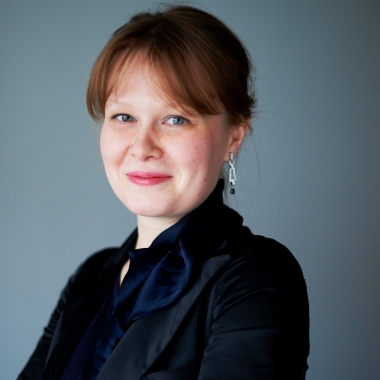
Alena Dzemidzenka
Belarus: Social Networks and an end to Lukashenka’s regime
Blog
06 Jul 2011
-
The Geneva Convention, adopted 70 years ago, was created as a tool for war refugees from Europe. Only with time did the Convention lift its geographical restrictions and established a universal nature of refugee protection. Today, some blame the Geneva Convention for causing the European asylum system to be unduly permissive with regard to access to asylum and other aspects of international protection.
Based on an analysis of relevant case law and international comparisons, the paper asserts that the Geneva Convention itself cannot be linked to certain overly generous interpretations and that such an outcome was not intended by the framers of the Convention. Rather, supplementary judicial and legislative interpretations, which have accumulated over decades, have caused Europe’s asylum system to become permissive in certain aspects, compared to those of other major democratic jurisdictions.
The paper offers several alternative views on how one may assess the differences in interpretations of the Geneva Convention between the EU, on the one hand, and Australia, the US and Canada, on the other. An examination of these differing perspectives allows us to advance operational efficiency of the EU’s asylum system by moving it closer to the original intention of the Geneva Convention.
EU Institutions Human Rights Migration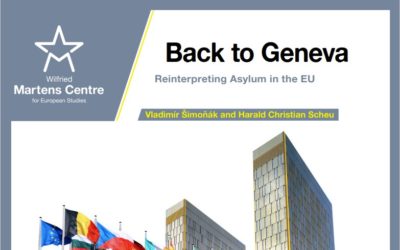
Back to Geneva: Reinterpreting Asylum in the EU
Research Papers
11 Oct 2021
-
This policy brief argues that the EU risks negative consequences if it continues to let economic interests prevail over its stated aim of promoting human rights in its relations with Central Asia. The strengthening of authoritarian regimes in Central Asia has led to the growth of social tensions and an increase in the number of possible hotbeds of radicalisation in the region, both of which, in turn, pose direct threats to the EU in matters of security, the influx of migrants and the protection of investments. In order to address these challenges, and taking into account the influence of Russia and China in the region, the EU should increase the effectiveness of its projects in the fields of education, health care, civil and political freedoms, good governance, justice reform and support for local civil society. The EU must make it evident to Central Asian states that strengthening cooperation with the Union offers these countries significant socio-economic benefits which cannot be gained from cooperation with China or Russia.
European Union Foreign Policy Human Rights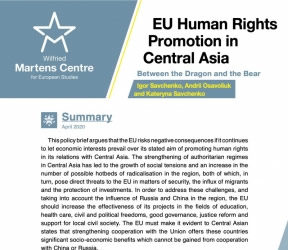
EU Human Rights Promotion in Central Asia – Between the Dragon and the Bear
Policy Briefs
06 Apr 2020
-
Search and rescue (SAR) in the central Mediterranean continue painting a disturbing portrait of European disunity on disembarkations and relocations of the rescued passengers. This research paper provides a more optimistic outlook. It argues that, despite the inter-governmental conflicts, which remain unresolved, the EU states have been developing a two-segment policy which has greatly reduced the numbers of irregular maritime arrivals via the central Mediterranean route. The European policy segment has consisted of SAR operations by the individual South European member states, ad-hoc arrangements following disembarkations and a coordinated withdrawal from the Libyan SAR zone.
The EU’s Afro-Asian policy segment has been based on the prevention of illegal border crossings and support for Libya and the other North African countries in running their own border control and SAR operations. The EU should be moving towards a policy that balances the traditional rights-based SAR system that primarily guarantees the rights of individuals with a functioning rules-based system that encourages adherence to international norms by all the countries around the Mediterranean. The EU needs to continue addressing the human rights abuses in the Libyan detention centres, without compromising on the imperative that the Libyan coastguard should continue bringing the rescued migrants back to their country.
Human Rights Mediterranean Migration North Africa
Rescue Operations in the Mediterranean: Towards a Reliable EU Policy
Research Papers
13 Nov 2019
-
Since the time that the popular uprisings in Syria mushroomed into a civil war, prospects for a negotiated political settlement have been thwarted because of the myriad diverging interests of the regime, local opposition groups, and regional and global actors, all of which are vying for power and influence in the country. Europe is deeply troubled by the human rights situation in the country. However, as currently organised, the EU lacks the foreign- and defence-policy mechanisms that would allow it to make a significant impact on the conflict.
Any chance of influencing the situation that the EU may have had in the beginning of the conflict dissipated relatively quickly. This paper recommends that the EU broadens its policy options and engages in ‘linkage politics’ with key powers, particularly Turkey, which has shared interests on certain fronts and direct influence on the ground in Syria. The EU has a long-standing relationship with Turkey, which was developed through the EU accession and customs union processes and more recently in connection with migration management.
Its concerns about Turkey’s descent into authoritarianism notwithstanding, the EU should build on this relationship to promote, as much as possible, a democratic, stable, just and prosperous Syria and greater Middle East region. More specifically, this broader policy framework should emphasise deeper and more sustained coordination of humanitarian responses, border management and de-mining. It should also stress the need for inclusive economic growth as concerns both the displaced Syrian private sector operating in Turkey and its Turkish business counterpart.
Democracy Foreign Policy Human Rights Middle East
Thin on the Ground: Recalibrating EU-Turkey Engagement in Syria
Research Papers
08 Jul 2019


